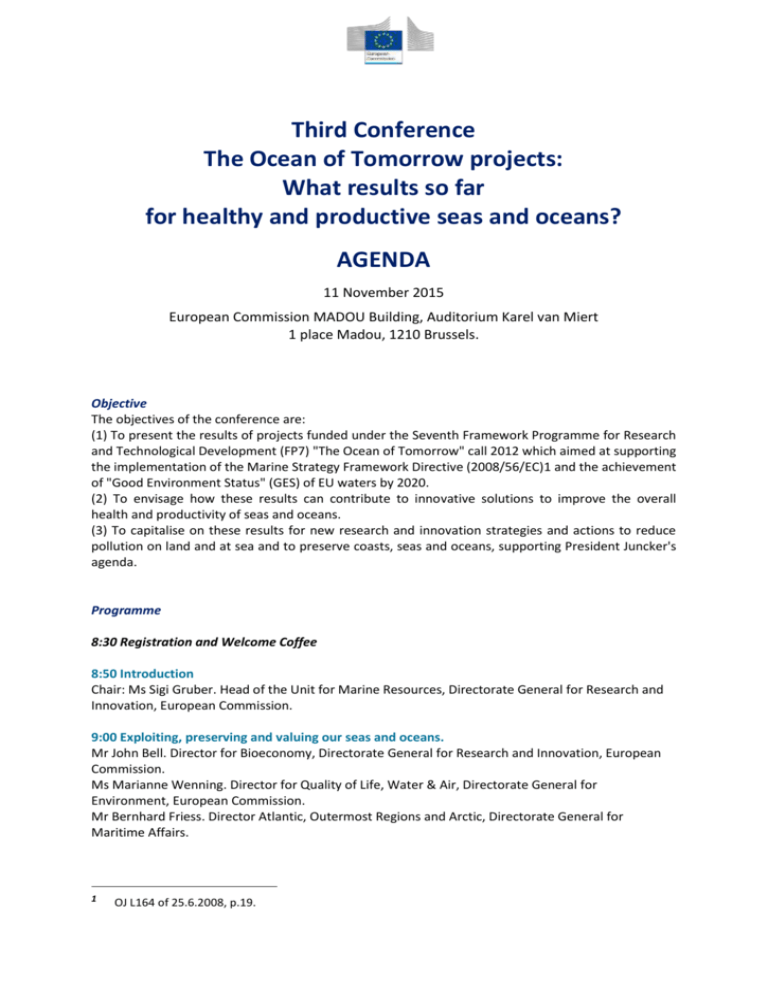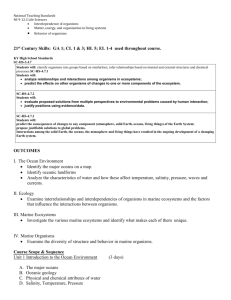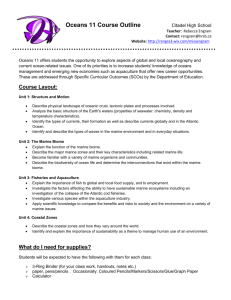the agenda here
advertisement

Third Conference The Ocean of Tomorrow projects: What results so far for healthy and productive seas and oceans? AGENDA 11 November 2015 European Commission MADOU Building, Auditorium Karel van Miert 1 place Madou, 1210 Brussels. Objective The objectives of the conference are: (1) To present the results of projects funded under the Seventh Framework Programme for Research and Technological Development (FP7) "The Ocean of Tomorrow" call 2012 which aimed at supporting the implementation of the Marine Strategy Framework Directive (2008/56/EC)1 and the achievement of "Good Environment Status" (GES) of EU waters by 2020. (2) To envisage how these results can contribute to innovative solutions to improve the overall health and productivity of seas and oceans. (3) To capitalise on these results for new research and innovation strategies and actions to reduce pollution on land and at sea and to preserve coasts, seas and oceans, supporting President Juncker's agenda. Programme 8:30 Registration and Welcome Coffee 8:50 Introduction Chair: Ms Sigi Gruber. Head of the Unit for Marine Resources, Directorate General for Research and Innovation, European Commission. 9:00 Exploiting, preserving and valuing our seas and oceans. Mr John Bell. Director for Bioeconomy, Directorate General for Research and Innovation, European Commission. Ms Marianne Wenning. Director for Quality of Life, Water & Air, Directorate General for Environment, European Commission. Mr Bernhard Friess. Director Atlantic, Outermost Regions and Arctic, Directorate General for Maritime Affairs. 1 OJ L164 of 25.6.2008, p.19. 9:30 – 10:50 Achieving Good Environmental Status (GES) of our seas and oceans through research and innovation. Session 1 –Presentation of STAGES, DEVOTES, AQUATRACE and BENTHIS projects. The projects will showcase how the research results contribute to understanding and maintaining biodiversity and how they can contribute to the achievement of Good Environmental Status as defined in the Marine Strategy Framework Directive. STAGES- Science and Technology Advancing Governance on Good Environmental Status. Ms Marisa Fernández Cañamero. Centro Tecnológico del Mar - Fundación CETMAR. Vigo, Spain. DEVOTES- Development of Innovative Tools for Understanding Marine Biodiversity and Assessing Good Environmental Status. Mr Ángel Borja. AZTI-Tecnalia, Marine Research Division, Pasaia, Spain. AQUATRACE- The Development of Tools for Tracing and Evaluating the Genetic Impact of Fish from Aquaculture. Mr Einar Eg Nielsen. Technical University of Denmark. Silkeborg, Denmark. BENTHIS- Benthic Ecosystem Fisheries Impact Study. Mr Adriaan Dirk Rijnsdorp. Wageningen University and Research Centre. Wageningen, The Netherlands. 10:50 – 11:10 Coffee break 11:10- 12:30 Achieving Good Environmental Status (GES) of our seas and oceans through research and innovation. Session 2 –Presentation of ECSAFESEAFOOD, KILL –SPILL, SONIC& AQUO projects. The projects will showcase how the research results contribute to understanding and monitor sea pollutants and stressors affecting food and environment and how they can contribute to the achievement of Good Environmental Status as defined in the Marine Strategy Framework Directive. ECSAFESEAFOOD- Priority Environmental Contaminants in Seafood: Safety Assessment, Impact and Public Perception. Mr Antonio Marques. Portuguese Institute for the Sea and Atmosphere, I.P. (IPMA). Lisbon, Portugal. KILL-SPILL - Integrated Biotechnological Solutions for Combating Marine Oil Spills. Mr Nicolas Kalogerakis. School of Environmental Engineering, Technical University of Crete. Chania, Greece. SONIC- Suppression of Underwater Noise Induced by Cavitation. Mr Christiaan A.F. de Jong. TNO. The Hague, The Netherlands. AQUO - Achieve Quieter Oceans by Shipping Noise Footprint Reduction. Mr Christian Audoly. DCNS Research. Toulon, France. 12:30-13:10 Briefing Event: Publication of European Marine Board Position Paper 22 Chair: Mr. Niall McDonough, Executive Secretary, European Marine Board. Speakers: Ms Sigi Gruber, Head of Marine Resources Unit, DG RTD. Mr Ricardo Serrão Santos, Member of the European Parliament. Mr Alex Rogers, EMB WG Deep Seas Chair, University of Oxford, UK. 13:10- 14:15 Lunch break 14:15- 15:15 Achieving Good Environmental Status (GES) of our seas and oceans through research and innovation. Session 3 – Presentation of BIOCLEAN, CLEANSEA, PERSEUS and COCONET projects. The projects will showcase how the research results contribute to monitor and reduce marine litter and how they can contribute to the achievement of Good Environmental Status as defined in the Marine Strategy Framework Directive. BIOCLEAN - New Biotechnological Approaches for Biodegrading and Promoting the Environmental Biotransformation of Synthetic Polymeric Materials. Mr Nicolas Kalogerakis. School of Environmental Engineering, Technical University of Crete. Chania, Greece. CLEANSEA- Towards a Clean, Litter-free European Marine Environment through Scientific Evidence, Innovative Tools and Good Governance. Ms Heather Leslie. Institute for Environmental Studies (IVM), VU University Amsterdam. Amsterdam, The Netherlands. PERSEUS - Policy-Orientated Marine Environmental Research for the Southern European Seas. Mr Evangelos Papanathanassiou. Hellenic Centre for Marine Research. Anavissos, Greece. COCONET -Towards Coast to Coast Networks of Marine Protected Areas (from the Shore to High and Deep Sea), Coupled with Sea-based Wind Energy Potential. Mr Ferdinando Boero. Università del Salento / CoNISMa / CNR-ISMAR. Lecce, Italy. 15:15 – 16:45 Engaging citizens towards protection and cleaning the seas and oceans - from vision to action. Ms Stefanie Werner. German Federal Environment Agency (UBA), Germany. Mr Ralph Schneider. PlasticsEurope AISBL. Mr Bernard Merkx. Waste Free Oceans. Mr Mike Mannaart. KIMO The Netherlands and Belgium. Ms Catherine Ferrant. Fondation Total. 16:45 – 17:15 Coffee break 17:15 The way forward - Wrap –up session Ms Sigi Gruber. Head of the Unit for Marine Resources, Directorate General for Research and Innovation, European Commission. Closing







